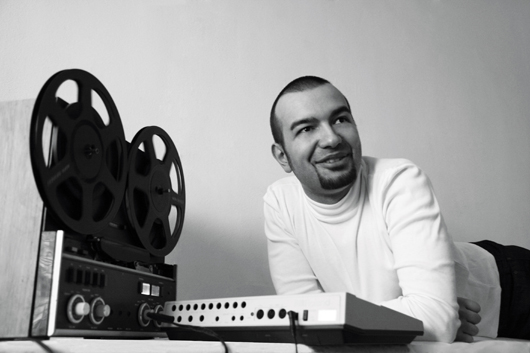KiNK: With an old PC, a Bulgarian producer puts his own bent on experimental tech-house.
Finding music was different before the Internet: Maybe a receptive record-shop owner let you listen […]

KiNK: With an old PC, a Bulgarian producer puts his own bent on experimental tech-house.
Finding music was different before the Internet: Maybe a receptive record-shop owner let you listen […]

Finding music was different before the Internet: Maybe a receptive record-shop owner let you listen to everything, or you picked up anything related to a good magazine article. Now, imagine your tastes run to experimental electronic music, it’s the early 1990s, and—oh, yeah—you live in Sofia, Bulgaria.
“When I got interested in the electronic sound in 1992, you could hear one, two techno tracks in some late-night radio show,” explains Strahil Velchev (a.k.a. KiNK). “I discovered experimental electronica and downtempo through a small record shop near the center of Sofia. The owner used to import CDs and cassettes by imprints like Warp and Ninja Tune… but I hadn’t gotten the chance to buy many records, so when my friend told me that it’s possible to make tracks on a cheap home PC, I thought that if I can’t buy much new music, I can make some!”
Velchev came to producing out of pure necessity, transforming a trickle of leftfield electronic records he was exposed to and a copy of early production software Jeskola Buzz into a burgeoning career as an experimental techno producer and DJ. He developed his skills like a painter copying the old masters, attempting to replicate the classic sounds of the Roland TB-303 and drum machines. “I got an old Vermona analog synth in 1998,” he explains. “The only thing I could do with it was simple subtractive synthesis, so I learned about waveforms and filters with my hands on the knobs. When I got my PC in 2000, and the modular software Buzz, I learned the rest mainly with experiments and reading some theory, but without knowing how other artists do it.”
Velchev found demand as a remixer through his experiments, at first for local and then more international acts, including some of the Bulgarian pop variety. “I loved the fact that I could turn a Top 40-style track into something with a totally different context,” he says. “I’m always happy when I can find a leading element in the original, like a good vocal or a nice melody, so I can build a track with KiNK sound aesthetics that still refers to the original.” That aesthetic is a nicely recognizable stamp that takes more straightforward techno and house tracks into the twistier, slightly abrasive perversions of beats and synth tones like on those early Warp records, then embraces the glitchy aesthetic of mistakes. That doesn’t mean Velchev has forgotten the poppier, housier records that filled Sofia’s late-night airwaves. KiNK’s “Existence,” from last year’s Rachel EP, with its canned snare rushes and relentless piano riff, is a straight-up, fist-pumping homage to Jeff Mills’ original piano house epic, “Changes of Life.” On his new 12″, “Leko,” Velchev imagines the same house pianos joyfully refracted through a funhouse mirror, computer loops showing defiantly; “Yako,” on the flip, showcases KiNK’s genre facility by turning the same tune into dissonant, trunk-rattling dubstep.
While Velchev is fast becoming Eastern Europe’s go-to guy in a new generation of leftfield acid techno and house creators, he’s also sought the assistance of collaborators Craig “Eviljack” Birmingham and Neville Watson, who’ve helped do the job that little shop in Sofia used to do: fill in the gaps he missed between disco and early Chicago and Detroit sounds. “Getting ‘in’ was a slow process, and it still continues,” he says. “If I stand out now, it’s because I’m faithful to this vision and I was patient enough to develop skills so I can reproduce any idea I have in my head.”
KiNK’s Rachel EP is out on now on Ovum.

